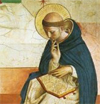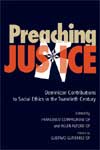Women Preaching Justice
The conference, held to coincide with the release of the book Preaching Justice. Dominican Contributions to Social Ethics in the Twentieth Century (2007, Compagnoni, OP and Alford, OP, ed.), featured the contributions of Dominicans friars, and included a chapter on the work of medical ethicists Benedict Ashley and Kevin O’Rourke written by Ruth Caspar, OP. The Introduction noted the fact that the contributions of women Dominicans, though not included, merited a second volume. The paper prepared by Toni Harris, OP, Co-Promoter of Peace and Justice, and presented by Ruth Caspar, OP, sought to highlight some of the heroic acts of Dominican women in the area of social ethics. The entirety of the paper follows. In her Dialogue, we find these words revealed by God
to Catherine of Siena: These words certainly suggest ethics for interdependent relationships in the human community. In my chapter on Dominican medical ethicists Benedict Ashley and Kevin O’Rourke, I made a brief reference to this sister of ours, Catherine. I noted in my conclusion that, like Catherine of Siena, Fathers Ashley and O’Rourke have positioned themselves in medio ecclesiae, encouraging others to fidelity to the Church’s moral teaching. (Preaching Justice, p. 242) However, in this “Roundtable Response,” we have been asked to do more than refer briefly to one of our Dominican sisters. My colleague, Sister Toni Harris OP, the current International Dominican Co-Promoter for Justice and Peace for the Dominican Order, although unable to be here today, has collaborated on this response, providing from her own research and experience examples of the contributions made by Dominican women in the area of social ethics. The title of the publication that we “launch” today, Preaching Justice: Dominican Contributions to Social Ethics, does not imply that it includes a comprehensive view of Dominican contributions. In fact, in his “Introduction,” Father Compagnoni points out that a very significant group is not included in this volume. He writes: One of the difficult decisions we had to make regarding this book was whether to include the contributions of Dominican sisters. In the end, we decided that the involvement of the sisters in social ethics should merit another book, one that we hope to produce in the future. Their commitment to social justice has been, if anything, more intense than that of the friars, especially since the Council, but it has often been expressed in different ways from those used by the friars. To try to add this other dimension of diversity, and to do justice to it, in a book already full of highly diverse experiences, seemed to us to be just a little too ambitious. (pp. 30-1) This particular Roundtable Response highlights in a much abbreviated manner only a few examples of the contributions of Dominican women in the area of social ethics. We hope that this simple introduction will help to clearly demonstrate the real necessity of what Father Compagnoni suggests: “ . . .that the involvement of the sisters in social ethics should merit another book.” Ethics can be defined as the discipline that deals with what is good and bad, with moral duty and obligation. It can take the form of a set of moral principles, or a theory or system of moral values. Thus “social ethics” refers to the moral principles or values that guide human activity in society. For Dominicans in a special way, the words from the 1971 document from the Synod of World Bishops, Justice in the World, are an important reference point: “Action on behalf of justice and participation in the transformation of the world fully appear to us as a constitutive dimension of the preaching of the Gospel, or, in other words, of the Church’s mission for the redemption of the human race and its liberation from every oppressive situation.” (Justice in the World, #6) In his Preface to the book we launch today, Father Gutierrez distinguishes “praxis and reflection.” The influence that Dominican sisters have had on social ethics comes not so much as research and reflection articulated in publications. Rather, Dominican sisters, as well as many of their Dominican brothers, have given voice to the ethics that promote a just society primarily through the witness of their lives. We recall once again Catherine of Siena, whose witness dates from the 14th century. We know that she preached by her actions the elements of social ethics for her day. She worked tirelessly for the poor, visited and cared for the sick. She accompanied a condemned criminal through his execution. A peacemaker, she mediated political and ecclesial conflicts of her day. In the Americas of the 16th century, Rose of Lima resisted racism. She chose not to be a cloistered nun because she believed that the racial discrimination in the monasteries of her day was a sign counter to the Gospel. It was her hope to found a monastery where women of all social categories would be welcome: indigenous, Spanish, mestizas, Blacks, and descendents of Moors. In France, in the late 17th and early 18th century, a young woman named Marie Poussepin became manager of her father’s bankrupt business and innovatively created meaningful work for the poor young people of her village. As a leader in her Dominican Third Order Fraternity, she inspired service to the poor, widows, the sick and orphans. Eventually, Marie gave all her possessions to this Fraternity and established a new form of Dominican sisters’ communal life—without cloister. Marie’s sisters continue today as the oldest and largest Dominican congregation of apostolic life in the world: Dominican Sisters of the Presentation. More than one hundred years later, also in France, a sister from Marie Poussepin’s congregation, Mother Henri Dominique, worked in collaboration with a Dominican friar, Marie-Jean-Joseph Lataste, to make a remarkable dream come true. Father Lataste was inspired by his ministry with women prisoners who wished to reform their lives. Mother Henri worked with him to create a Dominican community where women who were former prisoners could become sisters. They were integrated into an existing community in such a way that no one knew their past. This congregation became the Dominican Sisters of Bethany. In the 18th and 19th centuries, when women’s institutes of apostolic life began to blossom in the Church, the witness of Dominican sisters also abounded. Remarkable Dominican women—both from the laity and members of apostolic congregations—responded to human needs on every continent. The educational and health care systems these Dominican sisters sponsored have been involved consistently in empowerment of women, care for children, and ministry to the poor. All this activity speaks profoundly of social ethics. In the mid-20th century, under the direction of a committee of Bishops in the U.S., Dominican sisters developed a comprehensive program of education for Christian Social Living that found its way into Catholic elementary, secondary, and university-level education. Sisters Nona McGreal and Joan Smith of the Sinsinawa congregation, prepared a complete curriculum for teachers. This series, Guiding Growth in Christian Social Living, was published by Catholic University in three volumes and came to be known as the “Green Bible” by the teachers who implemented it in their classes. A group of Newburgh Dominican Sisters working under the direction of Sister Thomas Aquinas McManus, prepared a series of readers for elementary school children. Under the series title, Faith and Freedom Readers, these texts related the social teachings of the Church to the lives of the children, and indirectly to their parents. In the Asia-Pacific region during World War II, Dominicans—sisters among them—were interred in camps throughout the war zones along with the people whom they served. Later, during the Communist government’s take-over in China, sisters were again interred. Some died, while others were eventually released in extremely weak condition. During the apartheid era in South Africa, several congregations of Dominican sisters decided to open their schools to all races and accepted the risk involved with this desegregation. They were among the first to openly oppose an obviously unjust political system. They also undertook further public action in solidarity with the oppressed. Their ultimate goal was to ensure freedom without the will to revenge. By their activity in solidarity with the oppressed they contributed to the truth and reconciliation that, in spite of violence, South Africa continues to seek today. In these first years of the 21st century, Dominican sisters continue to respond to the needs of society and the Church. Their responses give voice to ethics for the present day. Consider some recent examples: On October 6, 2002, as the U.S. prepared to launch its bombing campaign against Iraq, three Dominican sisters, long term members of a nuclear disarmament organization, broke into the Minuteman III missile site near Greeley, Colorado (USA), armed only with hammers, prayers, and their own blood. Theirs was a symbolic act to “inspect, expose and disarm” the weapons of mass destruction that exist on American soil. Entering the silo, they poured their own blood in the shape of a cross, and pounded on the half-ton concrete silo lid with a household hammer. They were arrested. In April 2003, the sisters were charged with and convicted of malicious destruction of property and interfering with national defense. On July 25th of that year, Sister Jackie Hudson was sentenced to 30 months in prison, Sister Carolyn Gilbert to 33 months, and Sister Ardeth Platte to 41 months, by U.S. District Judge Robert Blackburn. In mid-October 2002, a convent of the Dominican Sisters of Bethany in Schwalmtal, Germany, granted asylum to a Kurdish family in order to give them time to prepare their documents to remain in Germany. This asylum was approved by the German government, but in spite of this a task force of the German police entered their convent and forced the sisters to open the door of the chapel where the family was hiding. The three male members of the Kurdish family were taken out, along with the sisters and other members of the peace group. The sisters considered their communal resistance to this violation of church-asylum to be a form of “holy preaching.” For 35 years the Interfaith Center on Corporate Responsibility (ICCR) has been a leader of the corporate social responsibility movement in the USA. Each year the member religious institutional investors sponsor over 200 shareholder resolutions on major social and environmental issues with corporations like Exxon, Wal-Mart, and many others. ICCR membership includes 275 faith-based institutional investors, including national denominations, religious communities, pension funds, foundations, hospital corporations, economic development funds, asset management companies, colleges and unions. Several US Dominican Sisters’ congregations are among the members. Dominican sisters attend the annual meetings of corporations in order to present shareholder resolutions urging corporations to be socially and environmentally responsible. In Peru, after three decades living side by side with the victims of war, the 85 year old sister from Spain known as “Madre Covadonga” remains a constant witness for justice in the much victimized region of Ayacucho. A Spanish missionary of the Dominican Congregation of the Rosary, she arrived in Peru in 1947, and adopted Peruvian citizenship in 1974. She survived the conflict waged by the Maoist group, Sendero Luminoso (1980-2000), and was the only foreign missionary who did not abandon the people of Ayacucho during the war. With awards from a large number of human rights organizations, she is the voice of conscience in this remote Andean region. Madre Covadonga received her most recent award on March 22, 2007 from the Defensoria del Pueblo, as an acknowledgement of her work in search of peace and for her support to victims of violence. Dominicans from around the US, along with their friends and students from several Dominican schools, helped to swell the crowd of over 25,000 people marching against the School of the Americas outside the gates of Fort Benning, Georgia, on November 18, 2007. Fort Benning is the site of the internationally notorious US Army training school for Latin American military and security personnel. For decades it was called the School of the Americas; now it is known as the Western Hemisphere Institute for Security Cooperation. Because its graduates include hundreds of military officers who have participated in human rights atrocities, and copies of torture manuals used at the school have been discovered, organizations across the world have called for its closure. In June 2007, 203 members of the US House of Representatives voted to close the scandal-ridden school—a vote that missed the margin of victory by six votes. Over the years of the annual protests, more than two hundred people, Dominican sisters among them, have served federal prison time for civil disobedience. From educational systems to individual acts of civil disobedience, Dominican women continue to contribute to the ethics that guide human activity in society. Their action for justice and their participation in the transformation of the world continue to be constitutive dimensions of their preaching of the Gospel. By their efforts they participate in the Church’s mission for the redemption of the human race and its liberation from every oppressive situation.
Preaching Justice The struggles and conflicts of the twentieth century raised a host of ethical questions– from the rise of Nazism in Germany and of Fascism in Italy and Spain and the spread of Communism in Eastern Europe, to apartheid in South Africa, and the problems of wealth distribution and military dictatorship in South America, on to medical ethics in the USA. Preaching Justice introduces the work of thinkers and activists who made significant contributions in their own countries, contributions which are of lasting value for thinking about social ethics. Preaching Justice covers the work of over 30 individual Dominicans – ranging from friars who went down the mines in the early 1900s, through lay Dominican artists who developed radical social aesthetics, to a friar who won the Nobel Peace Prize in 1958; and on to those who resisted totalitarian communism in Eastern Europe, military dictatorship in Brazil, and structural sin in South Africa. The Dominicans discussed here were deeply involved in all the major political and socio-economic issues of their day. Preaching Justice contains information not previously available in English about events in the former Yugoslavia, in Poland and in Brazil. Each of the 19 essays combines biography and the historical background with a clear account of each person’s thinking and teaching. In the Preface, Gustavo Gutiérrez addresses the need to
understand the structural causes of social evil and to appreciate
the biblical and theological meanings of poverty Preaching Justice
tells of the lives and studies of thinkers who helped draft major
Church documents, such as Populorum Progressio (Pope Paul VI) and
Gaudium et Spes (Vatican II).
|
You can order Preaching
Justice directly from the website of Dominican Publications Read Chuck Dahm's review of the book |




